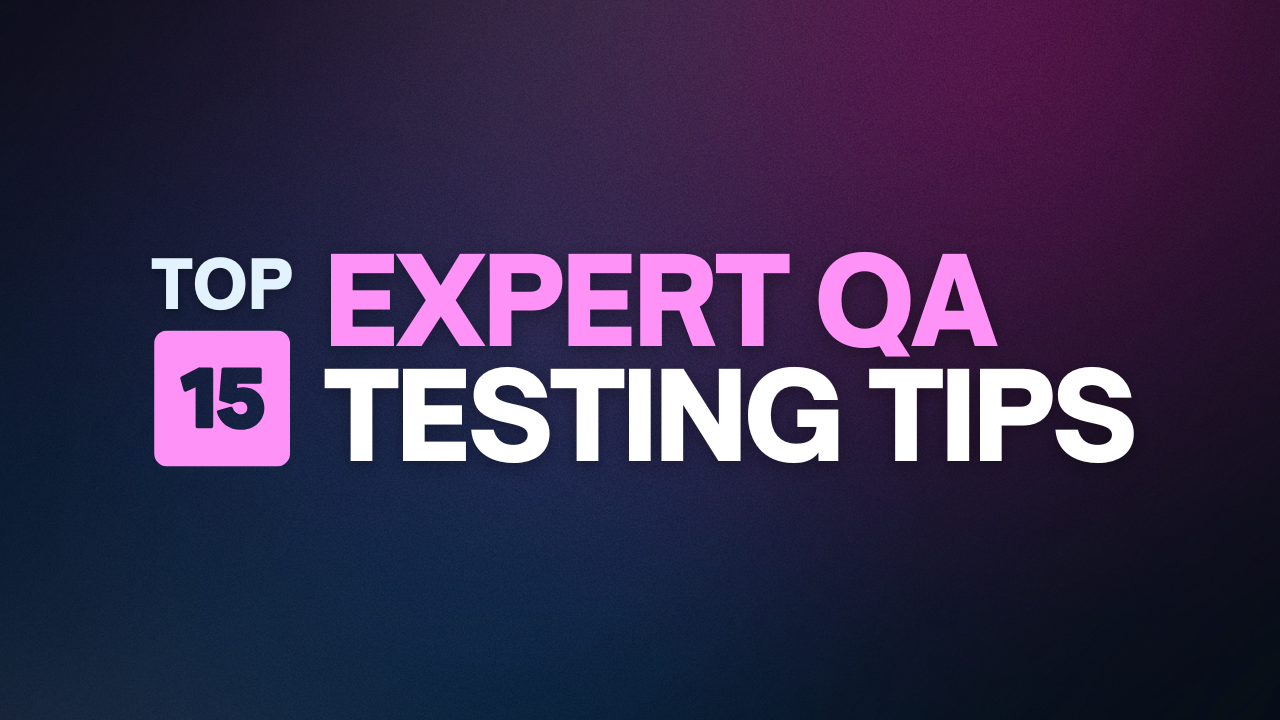Increasingly, businesses are turning to independent talent to strengthen their technical capabilities. The software development industry is actively shifting toward hybrid teams, making freelance software quality assurance testers highly valuable additions to any development team.
This guide will walk you through what QA testing involves and provide practical tips to help you succeed in this growing field.
What do QA testers do?
Websites, software products, games, and web platforms all need thorough vetting before release. QA testers are crucial throughout the software development lifecycle, performing both automated and manual testing using various methods like functional testing, configuration testing, and system testing. As a freelance QA tester, you'll need to understand different testing types and their impact on software performance. You'll conduct quality assurance for web, mobile, and desktop applications. Since the process involves extensive communication between developers, engineers, and other team members, excellent communication skills are essential.
QA testers typically review system specifications and run tests to ensure software meets requirements. You'll identify functional bugs and run debugging programs to fix issues. A key part of your role will be recording defects and creating detailed bug reports for development teams. You'll also collaborate with QA engineers to develop effective testing strategies and plans. In most organizations, QA testers work alongside QA analysts who design the tests and QA managers who provide further validation and quality control.
How to become a successful QA Tester
Here are 15 helpful tips to guide you in becoming a successful QA tester. These tips cover the basics, from learning important tools to gaining experience, to help you get started and grow in the QA testing field.
1. Identify potential clients
The QA testing industry is vast and varied. Before investing time and resources in technical training, research the skills requirements of companies you'd like to work with. Use job platforms to discover which testing types are in demand and whether you need to upgrade your skills.
2. Get trained
While many clients prefer testers with degrees in engineering or computer science, it's not always required. Most selection processes involve technical testing, which you should prepare for by taking online courses that cover test automation tools, programming languages, and mobile device testing.
Consider pursuing IT certifications from organizations like Association for Software Testing (AST), Society of Quality Assurance (SQA), or International Software Testing Qualifications Board (ISTQB). These certifications can boost your credibility whether you're new to the field or an experienced tester looking to advance.
3. Learn the tools of the trade
To sell yourself effectively, you need to speak the language of testing. Familiarize yourself with common applications used by testers and programmers. Test automation frameworks like Appium, Selenium, and JUnit provide guidelines for creating test cases. You should also understand bug tracking tools such as Bugzilla, JIRA, and Mantis which help record and monitor issues. Test management software including qTest, Zephyr, and Xray will be essential for managing test cases and creating actionable reports. Always research which specific tools your potential clients prefer.
4. Hone your hard and soft skills
Successful QA testers need both technical expertise and interpersonal abilities. On the technical side, you need attention to detail for catching subtle defects and critical thinking to anticipate challenges. Test automation proficiency, database testing skills, and project management abilities are also crucial. Equally important are soft skills like clear communication to prevent misunderstandings and analytical thinking to break down complex systems. Being adaptable helps you learn new tools quickly, while problem-solving abilities let you troubleshoot issues effectively. Strong teamwork skills ensure smooth collaboration with developers and managers throughout projects.
5. Gain experience
Hands-on experience is invaluable for your development as a QA tester. Try contributing to open-source projects on platforms like GitHub where you can practice finding and fixing bugs in real code. Developing personal projects such as creating your own testing tools or frameworks can demonstrate initiative and technical skill. Consider taking internships or entry-level positions where you can learn professional workflows, use industry tools, and collaborate with experienced team members who can mentor your progress.
6. Network and follow industry trends
Stay updated with innovations to anticipate industry shifts and adapt to new methodologies. AI-driven testing tools have become increasingly popular for automating tests and quickly identifying potential issues. Follow industry blogs like Software Testing Help and QA Touch to keep learning. Participate in webinars and virtual conferences such as Testμ and Automation Guild to gain insights into emerging tools and practices. Experimenting with new testing approaches gives you hands-on experience and helps you understand both their potential and limitations in real-world applications.
7. Understand Agile and DevOps
Agile is a flexible approach to software development that breaks projects into small, manageable parts called sprints. As a QA tester in an Agile environment, you'll work closely with developers, testing continuously throughout development rather than just at the end. DevOps combines development and IT operations to improve the entire software delivery process. In this framework, testing is integrated seamlessly into a continuous cycle, leading to faster and more reliable releases. Learning these methodologies through boot camps, online courses, workshops and communities will make you more valuable to potential clients who have adopted these practices.
8. Build a strong portfolio
A compelling portfolio demonstrates your technical abilities, experience, and problem-solving skills to potential clients. Include detailed information about completed projects, any certifications you've earned, and testimonials from satisfied clients. Showcase your hard and soft skills and provide examples of test automation frameworks you've developed. Your portfolio should highlight your unique strengths and the value you can bring to software development projects through thorough and efficient testing practices.
9. Learn common testing methodologies
Expanding your knowledge across various testing approaches helps you handle different scenarios effectively. Functional testing ensures each component works according to requirements, like verifying users can add products to a shopping cart. Stress testing pushes systems beyond normal limits to assess stability under extreme conditions. Performance testing evaluates responsiveness and speed under different workloads, such as checking how quickly a banking app processes transactions during high usage periods. The more testing types you understand, the more versatile you'll be as a QA professional.
10. Master test planning and documentation
Well-crafted test plans outline objectives, scope, resources, and schedules for testing activities. Thorough documentation, including detailed test cases and comprehensive reports, ensures clear communication throughout the testing process. These skills enhance testing efficiency and contribute to software quality by providing a structured framework. Consider taking specialized courses on test planning and documentation to strengthen these crucial abilities that many testers overlook but experienced professionals value highly.
11. Brush up on UX and coding languages
Understanding user experience helps you identify usability issues that purely technical tests might miss. By considering how end users will interact with software, you can spot problems with navigation, responsiveness, and overall usability. Additionally, learning common programming languages like Java, Python, JavaScript, and C# will allow you to create automated test scripts more efficiently and communicate more effectively with developers. Coding knowledge helps you troubleshoot failures and adopt new testing tools quickly, making you more versatile and valuable as a QA tester.
12. Practice effective bug reporting
Learn to write clear, concise bug reports that help developers understand and fix issues quickly. Your reports should include detailed steps to reproduce the problem, expected versus actual results, and relevant screenshots or videos. Effective bug reporting speeds up the resolution process and improves overall product quality by ensuring that problems are addressed properly the first time instead of requiring multiple cycles of clarification and rework.
13. Develop security testing awareness
With cyber threats constantly evolving, understanding security testing principles makes you more valuable to clients. Learn to identify common vulnerabilities like cross-site scripting, SQL injection, and insecure authentication. Familiarity with tools like OWASP ZAP and Burp Suite can help you conduct basic security assessments alongside functional testing. This added dimension to your testing skills addresses a critical concern for modern software development teams focused on protecting user data and system integrity.
14. Build communication and reporting skills
The ability to communicate technical information clearly to both technical and non-technical stakeholders is essential. Practice explaining complex testing concepts in simple terms and creating visual representations of test results. Regular status updates and well-organized test summary reports keep everyone informed about testing progress, coverage, and discovered issues. These communication skills facilitate better collaboration and help teams make informed decisions about product readiness and release timing.
15. Develop a continuous learning mindset
The testing field evolves rapidly with new tools, methodologies, and best practices emerging regularly. Set aside time for ongoing education through online courses, professional reading, and community participation. Join testing communities on platforms like LinkedIn and Reddit to exchange knowledge with peers. Consider setting personal learning goals each quarter to systematically expand your testing expertise and stay current with industry developments that can give you a competitive edge.
Starting your QA testing career
QA testing offers abundant opportunities for those willing to invest in developing their skills. By mastering both technical abilities and soft skills, understanding essential tools, and learning key methodologies, you can build a rewarding career in this growing field. Continue building your portfolio, gaining hands-on experience, and networking within the industry. With dedication and the right approach, you can become a valued QA tester who contributes to creating high-quality software products that shape our digital world.



